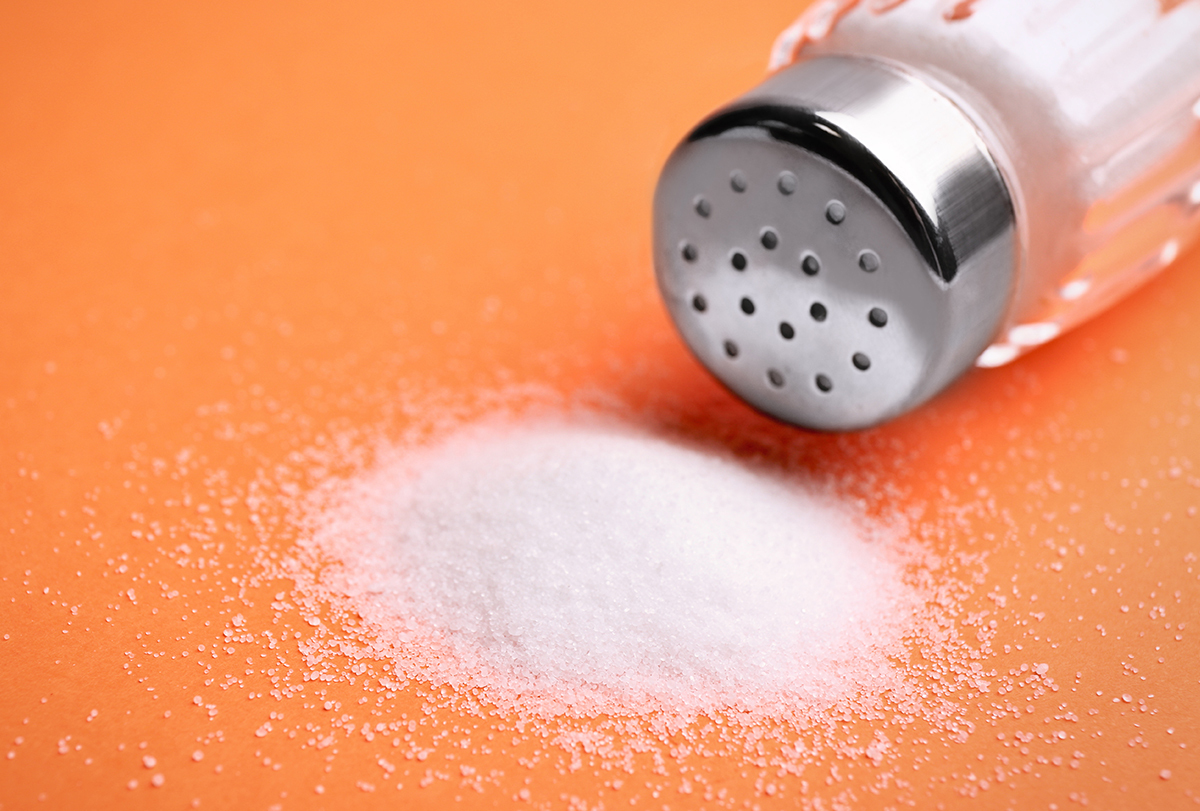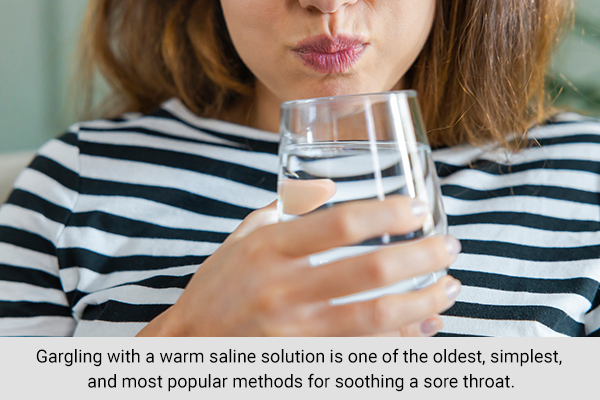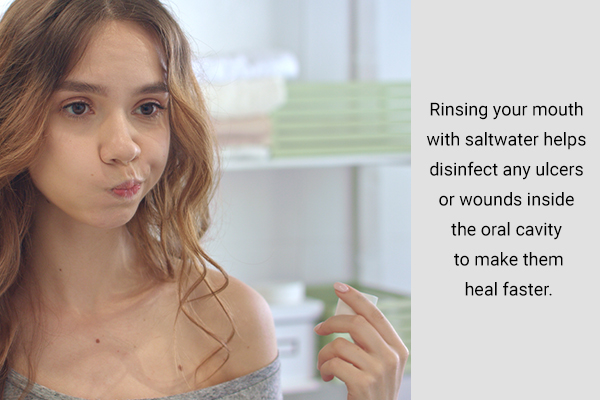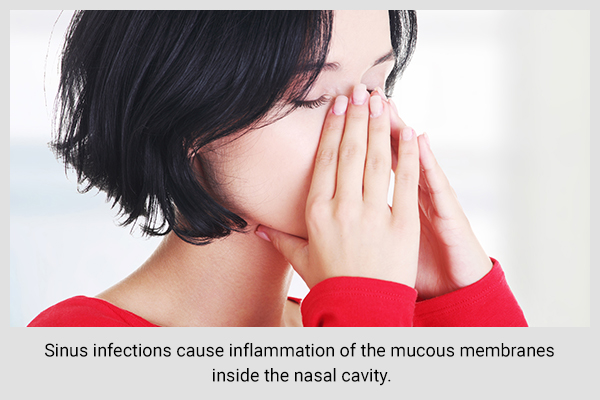In this article:
Common salt, table salt, or sodium chloride (NaCl) is part of every diet, but it does more than just add flavor to your food.

The sodium in this compound is an essential nutrient required for a variety of life-sustaining body functions. Plus, it is known to exhibit many therapeutic properties that can help fight some common ailments without the side effects associated with regular medication.
This article will list some lesser-known pharmacological and miscellaneous uses of salt that can help you make the most of this humble ingredient.
Topical Benefits of Common Salt
Here are some uncommon uses of salt that can help treat some common day-to-day maladies.
1. Relieves sore throat

Gargling with a warm saline solution is one of the oldest, simplest, and most popular methods for soothing a sore throat. It works for both infectious and noninfectious cases.
The antiseptic properties of sodium help kill the germs in your pharyngeal mucosa, thus speeding up recovery from a sore throat caused by a bacterial or viral infection. (1)(2)
It also helps alleviate nonbacterial pharyngitis by bringing down the inflammation in the throat, thereby easing the pain and scratchiness. (3)
Moreover, sodium’s anti-inflammatory effects along with the warmth of the solution help reduce the swelling to provide quick relief. The water also dilutes and loosens the thick mucus or phlegm inside the throat so that it can be easily expelled.
How to use:
- Dissolve ½ teaspoon of salt in 1 cup of warm water.
- Gargle with this solution multiple times, for 15–30 seconds each.
- Always spit out after gargling.
- Do this several times a day. (4)
2. Treats insect bites
Salt may prove useful in treating certain insect bites or stings due to its antiseptic and anti-inflammatory properties. It aids in disinfecting the wound, neutralizing some of the venom, and controlling the pain, redness, swelling, and irritation.
The trick is to use this remedy as soon as possible to minimize the inflammatory reaction that occurs after a bite. Protecting the wound from infection is extremely important to facilitate timely and proper healing.
Traditionally, people mixed salt, vinegar, and occasionally turpentine in their bath water to relieve insect bites. (5)
How to use:
- Wash the affected area using an antiseptic (nonscented) soap and lukewarm water.
- Mix a few drops of water in some salt to make a thick paste and smear it all over the sting or bite site.
- Let it dry for 30 minutes before rinsing it off with plain water.
- Repeat as needed.
If redness persists or you suspect the bite to be from a diseased or venomous animal, seek medical attention immediately.
3. Cleanses the oral cavity

A warm saline solution serves as a natural mouthwash that can thoroughly cleanse the oral cavity. In fact, this remedy is often recommended by dentists as a complementary measure to routine oral care.
The antimicrobial properties of salt target the germs in the mouth, reducing the risk of plaque buildup, cavities, bad breath, and infections. Plus, it works as an anti-inflammatory agent that curbs gum swelling and dental pain.
In addition, rinsing your mouth with salt water helps disinfect any ulcers or wounds inside the oral cavity to make them heal faster. (6)
How to use:
- Mix 1 teaspoon of salt in 300–350 ml of warm water.
- Use this solution to rinse your mouth as part of your oral care regimen. (7)
4. Eases foot pain
Your feet carry the load of your body throughout the day and undergo a lot of wear and tear in doing so. Thus, it is natural for your feet to hurt from time to time due to the constant strain and trauma they are subjected to.
Foot pain is especially common if you spend a long time standing, running, or walking, if you wear ill-fitting shoes, or after spraining your foot. Ignoring the discomfort can make it worse over time and limit your activity.
The wise thing to do is to rest your tired, worn-out feet as much as you can and treat them to a saline soak. Salt helps reduce the underlying inflammation, easing the pain and relaxing the feet.
How to use:
- Mix some salt in a tub or bucket of warm water.
- Dip your feet in it for 10–15 minutes, twice a day. (8)
5. Reduces nasal sinus inflammation

Sinus infections cause inflammation of the mucous membranes inside the nasal cavity, causing the secretion of a lot of mucus that blocks your breathing passage, resulting in a stuffy or runny nose. This type of nasal congestion can be extremely uncomfortable for as long as it lasts.
Doctors often recommend using saline solution to rinse the nasal passage for quick relief. You can get ready-to-use nasal sprays from drugstores or prepare them at home.
The salt water helps relieve the swelling in the mucous membranes and thins out the mucus for easy expulsion. This therapeutic effect can be attributed to the anti-inflammatory nature of sodium.
Moreover, salt works as an antiseptic that helps fight the germs causing infection and inflammation in the first place. Thus, this simple remedy not only helps alleviate your symptoms but may also shorten the duration of the infection. (9)
How to use:
- Dissolve 1 teaspoon of salt in 2 cups of warm distilled water.
- Pour this solution into a neti pot or other nasal irrigation device and use it to rinse your nasal passages.
- Do this 1–2 times daily for a couple of days.
6. Treats puffy eyes
The area around the eyes often turns puffy due to excessive screen time, sleep deprivation, water retention, crying, etc. Although puffiness around the eyes is rarely a cause for concern, they can make you look tired and unwell.
Salt offers a quick solution to get rid of the swelling for a more relaxed and refreshed look. This is all due to its potent anti-inflammatory properties. (10)
How to use:
- Mix ½–1 teaspoon of salt in a bowl of comfortably warm water.
- Soak two cotton balls in this solution and wring out the excess liquid.
- Close your eyes and place the damp cotton over your lids for a few minutes.
- Repeat the process for 15–20 minutes.
Role of Sodium in the Body
Sodium is involved in the following physiological processes:
- Maintenance of electrolyte balance
- Maintenance of cell plasma volume
- Maintenance of pH balance
- Nutrient absorption
- Nerve impulse transmission
- Muscle function (11)
- Normal cell physiology
- Metabolism
Medicinal Effects of Sodium
Sodium is credited with the following healing properties:
- Works as an antiseptic against certain bacterial and fungal strains to prevent infections (12)
- Helps in the regulation of menstrual periods
- Helps kill worms or ectoparasites
- Helps relieve inflammation
Recommended Intake of Salt
The World Health Organization (WHO) stipulates that one should not consume more than 1,500 mg (¾ teaspoon) to 3.75 g salt a day. Unfortunately, the average salt intake all over the world is reported to be beyond the recommended limit, figuring around 9–12 g a day. (13)
Regularly consuming too much salt can trigger a number of deleterious health effects such as electrolyte imbalance, hypertension, and fluid retention inside the body, which cause swelling in the lower limbs, among other issues. (10)
Why Is a Low-Sodium Diet Recommended?
Sodium controls fluid balance in the body and maintains blood volume and blood pressure. Intake of too much sodium may raise blood pressure and cause fluid retention, which could lead to swelling of the legs and feet or other health issues.
The body needs only ¼ teaspoon of salt every day. Sodium is found naturally in foods, but a lot of it is added during processing and preparation. (14)
Final Word
Salt can be used topically for relieving some benign pains and discomforts without the risk of side effects. Thus, it can save you from taking unnecessary medications, which can increase the toxic load on your body over time.
Plus, it is more economical, easily available, and eco-friendly as well.
- Was this article helpful?
- YES, THANKS!NOT REALLY


